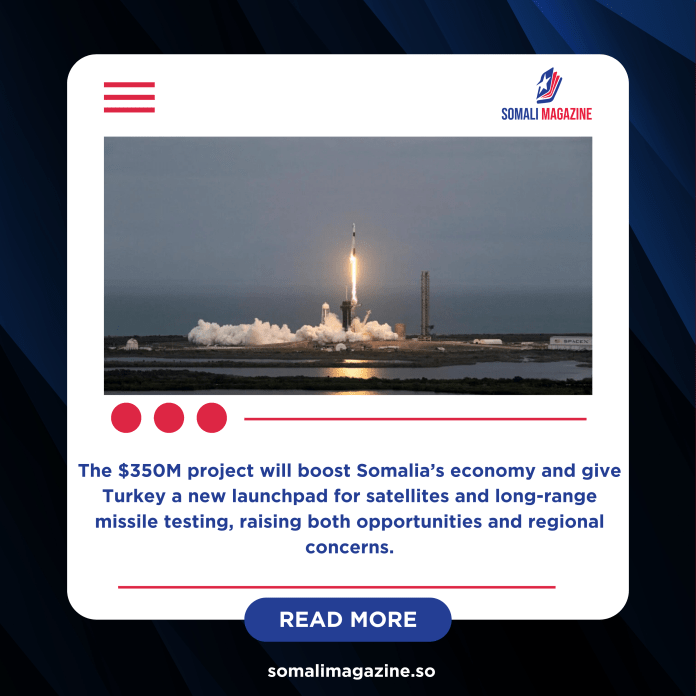Facebook Twitter (X) Instagram Somali Magazine - People's Magazine
Turkey is moving forward with plans to build a large spaceport on Somalia’s coast that will support satellite launches and testing of long-range missiles. The project, led by the Turkish Space Agency (TUA), marks a major expansion of Turkey’s military and strategic presence in East Africa.
The spaceport will be located along the Indian Ocean and cover an area of 900 square kilometres. Once completed, it will become Africa’s first orbital launch site. According to Turkish officials, the site will allow Turkey to launch satellites into space without relying on foreign facilities. It will also serve as a secure area for testing advanced missile systems far from heavily populated zones.
The project follows a Defence and Economic Cooperation Framework Agreement signed between Turkey and Somalia last year. Somali President Hassan Sheikh Mohamud called it a “historic partnership” that will create jobs, generate income, and open new opportunities for Somalia. He said the launchpad’s importance goes beyond its financial benefits.
In addition to launching satellites, the facility will also be used to test long-range missiles. Reports from Turkish media say Turkey plans to test new missile systems with ranges over 1,000 kilometres. These tests will take place over the Indian Ocean, avoiding any civilian or commercial air routes.
Currently, Turkey’s longest-range missile, the Tayfun, has a maximum range of 561 kilometres. A new hypersonic version called Tayfun Block 4 is in development and is expected to be tested at the Somalia site. This missile can reportedly travel at speeds over Mach 5, but it has not yet been tested over open water.
Turkish defence experts believe the Somalia site will be essential for Turkey’s goal to develop missile systems with ranges up to 3,000 kilometres. It would allow the country to conduct missile tests without relying on limited domestic test zones, such as the one in Sinop on the Black Sea.
Somalia’s location near the equator gives it an advantage for space launches. Rockets launched from the equator use less fuel and can carry heavier payloads. The site’s access to the open ocean also makes it ideal for high-risk tests and launches.
Construction of the spaceport is expected to start later this year. A bidding process for construction companies will be announced soon. Turkish officials estimate the facility will take around two years to complete.
Initial cost estimates range from $350 million to as high as $6 billion, depending on the project’s future size. Given that the Turkish Space Agency has a modest annual budget of around $40 million, the project will likely need foreign investment. Some reports suggest that the United Arab Emirates may be interested in partnering, though no formal agreement has been made.
This project strengthens the growing relationship between Turkey and Somalia. Since President Erdoğan’s visit to Mogadishu in 2011, Turkey has invested heavily in Somalia, providing aid, training soldiers, and building infrastructure. In 2017, Turkey opened Camp TURKSOM, its largest military base abroad, and recently signed a 10-year deal allowing its navy to patrol Somali waters.
However, not everyone supports the plan. Some Somali lawmakers have raised concerns about transparency, pointing out that technical details and environmental assessments have not been shared with the public. There has also been little public consultation about the spaceport.
Although nearby countries have not formally objected, experts warn that using the spaceport for both civilian and military purposes may raise concerns in the region. Several powers—including China, Russia, the UAE, and Egypt—are also competing for influence in East Africa.
The Somalia spaceport is a key part of Turkey’s 2022–2030 National Space Program, which includes plans for satellite launches, lunar missions, human spaceflight, and building Turkish-made launch vehicles. Once completed, the facility could offer commercial launch services to clients worldwide, helping Turkey grow into a regional leader in space and defence technology.

